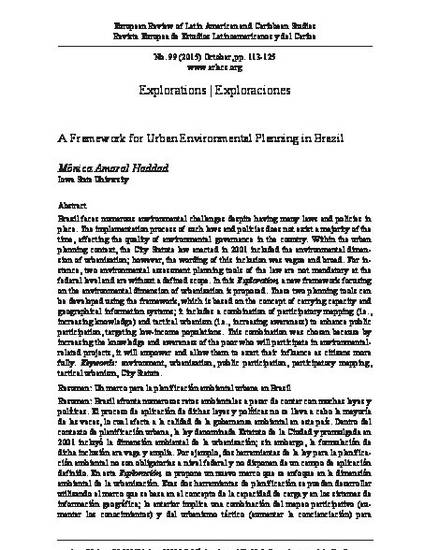
Article
A Framework for Urban Environmental Planning in Brazil
European Review of Latin American and Caribbean Studies
Document Type
Article
Disciplines
Publication Version
Published Version
Publication Date
10-1-2015
Abstract
Brazil faces numerous environmental challenges despite having many laws and policies in place. The implementation process of such laws and policies does not exist a majority of the time, affecting the quality of environmental governance in the country. Within the urban planning context, the City Statute law enacted in 2001 included the environmental dimension of urbanization; however, the wording of this inclusion was vague and broad. For instance, two environmental assessment planning tools of the law are not mandatory at the federal level and are without a defined scope. In this Exploration, a new framework focusing on the environmental dimension of urbanization is proposed. These two planning tools can be developed using the framework, which is based on the concept of carrying capacity and geographical information systems; it includes a combination of participatory mapping (i.e., increasing knowledge) and tactical urbanism (i.e., increasing awareness) to enhance public participation, targeting low-income populations. This combination was chosen because by increasing the knowledge and awareness of the poor who will participate in environmentalrelated projects, it will empower and allow them to exert their influence as citizens more fully.
Creative Commons License
Creative Commons Attribution 3.0
Copyright Owner
Mônica Amaral Haddad
Copyright Date
2015
Language
en
File Format
application/pdf
Citation Information
Monica A. Haddad. "A Framework for Urban Environmental Planning in Brazil" European Review of Latin American and Caribbean Studies Vol. 99 (2015) p. 113 - 125 Available at: http://works.bepress.com/monica-haddad/2/

This is an article from European Review of Latin American and Caribbean Studies, 99 (2015); 113-125.